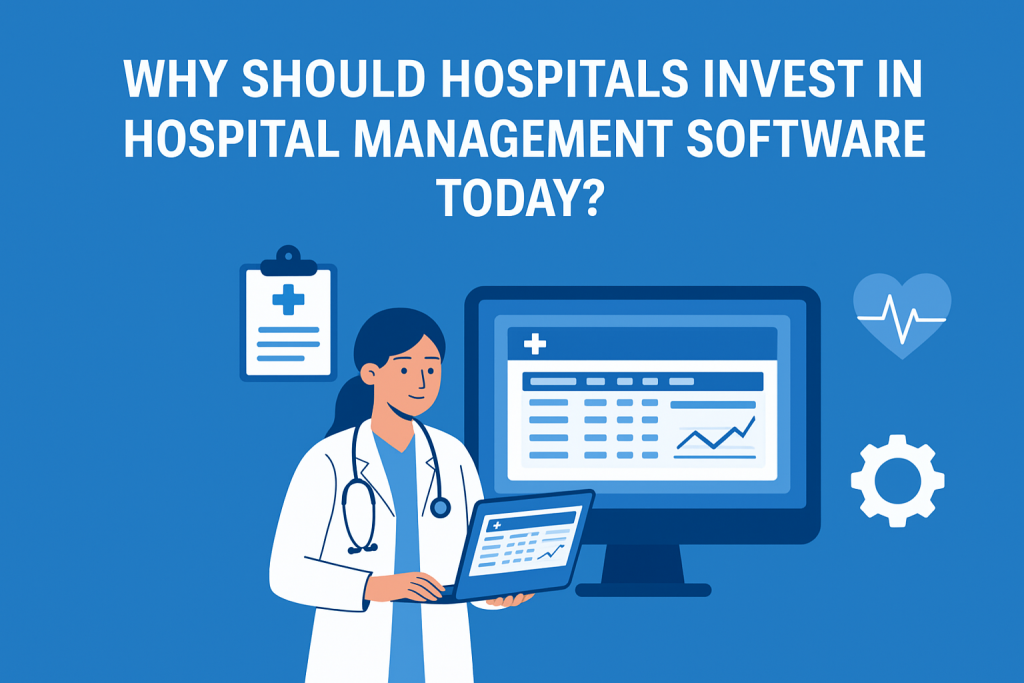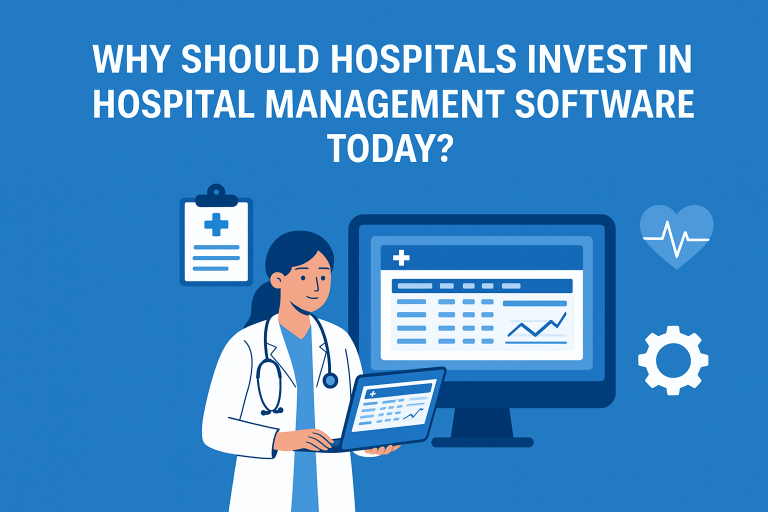Healthcare today is no longer limited to just providing treatment; instead, it is about offering seamless patient experiences, reducing human error, and improving operational efficiency. Consequently, hospitals are increasingly turning to hospital management software — a smart solution that helps healthcare institutions simplify administration, manage patients, track billing, and enhance overall medical care.
In fact, with the rise of digital transformation, adopting such solutions is no longer optional. Rather, it has become a necessity for hospitals that want to stay competitive in an industry where patient expectations and regulatory requirements are continuously growing.
If you’re a hospital owner, administrator, or even a patient curious about how technology is transforming healthcare, this detailed guide will answer all your key questions.
What is Hospital Management Software?
Short Answer:
Hospital management software is a digital system that automates and manages different operations of a hospital, such as patient records, billing, pharmacy, laboratory tests, and staff management.
Detailed Explanation:
Instead of maintaining bulky files and depending solely on manual staff input, hospitals now rely on smart hospital software that centralizes all critical information on a single platform. For example, from scheduling appointments to managing pharmacy stock and generating bills, hospital software ensures that no detail is overlooked.
Moreover, this digital solution saves time, minimizes human errors, and creates a smoother patient experience. As a result, hospitals can deliver both high-quality medical treatment and efficient administrative services, which is exactly what modern patients expect.
Why Do Hospitals Need Hospital Management Software?
Short Answer:
Because it reduces manual errors, saves costs, increases efficiency, and ensures better patient satisfaction.
Detailed Explanation:
Hospitals often handle massive amounts of data on a daily basis. Without a proper system, mistakes are bound to occur — from billing errors to misplaced patient reports. However, a reliable hospital management software integrates all departments, ensuring that doctors, nurses, administrators, and even patients remain connected through a single platform.
Key Benefits Include:
- Accurate patient data tracking.
- Real-time access to medical history.
- Streamlined billing and pharmacy operations.
- Better communication between departments.
- Enhanced decision-making with automated reports.
Therefore, by investing in such a solution, hospitals not only optimize efficiency but also build stronger trust with patients.
Key Features of Hospital Management Software
When choosing the right system, it is crucial to evaluate the features. In addition to basic management functions, advanced software offers modules that cover every aspect of healthcare operations.
- Patient Management: Registration, appointment booking, and medical history tracking.
- Billing & Accounting: Automated invoicing, insurance integration, and real-time billing updates.
- Pharmacy Management Software Integration: Stock updates, prescription tracking, and automated reordering.
- Laboratory Software Integration: Sample tracking, automated test results, and error-free reporting.
- Staff & Doctor Scheduling: Duty rosters, shift management, and doctor availability updates.
- Data Security: Encrypted patient records and GDPR/HIPAA compliance for global standards.
Consequently, hospitals using such features enjoy a holistic approach to management rather than juggling multiple disconnected systems.
Difference Between Hospital Software and Traditional Management
To better understand the impact, let’s compare hospital software with traditional manual systems:
| Aspect | Hospital Software | Traditional Management |
|---|---|---|
| Patient Records | Centralized, digital, easily accessible | Manual, paper-based, prone to loss |
| Billing | Automated, accurate, faster | Manual entry, error-prone |
| Pharmacy Management | Integrated with stock alerts & prescriptions | Manual stock updates |
| Laboratory Software | Automated reports, minimal error | Manual testing records |
| Efficiency | High, saves time & cost | Slow, resource-intensive |
Thus, it becomes clear that modern hospital software not only saves time but also dramatically improves reliability compared to traditional methods.
How Does Pharmacy Management Software Help Hospitals?
Short Answer:
It helps hospitals manage drug inventory, avoid stock-outs, and prevent prescription errors.
Detailed Explanation:
Pharmacy is a critical part of healthcare operations. With pharmacy management software, hospitals can track medicines in real time, set reminders for low stock, prevent over-prescription, and even integrate prescriptions digitally for faster service.
Moreover, this reduces wastage, improves patient safety, and ensures doctors and pharmacists remain aligned. As a result, the entire hospital workflow becomes smoother, leading to faster patient recovery and greater trust in the system.

What Role Does Laboratory Software Play in Healthcare?
Short Answer:
It improves test accuracy, speeds up reporting, and ensures doctors receive timely results.
Detailed Explanation:
Hundreds of samples are frequently handled daily in laboratories. Manual recording, therefore, can easily lead to delays or even serious errors. However, by integrating laboratory software, all test samples are tracked digitally, and reports are automatically uploaded to the patient’s file.
Consequently, doctors gain quicker access to accurate results, which directly improves diagnosis and treatment timelines. Patients, in turn, benefit from faster recovery and better medical outcomes.
Step-by-Step Guide to Choosing the Right Hospital Management Software
Choosing the right system requires careful evaluation. Therefore, follow these steps to ensure you select the most effective solution:
- Identify Your Needs: Small clinics may only require basic features, while large hospitals need advanced modules.
- Check Integration Capabilities: Ensure it integrates smoothly with pharmacy, billing, and laboratory software.
- Evaluate User-Friendliness: Pick software that staff can learn quickly without intensive training.
- Look for Cloud Solutions: Cloud-based hospital software allows anytime, anywhere access.
- Check Data Security: Confirm compliance with HIPAA, GDPR, or NDHM standards.
- Ensure Scalability: Choose a system that grows as your hospital expands.
As a result, hospitals that follow these steps can confidently invest in software that truly meets their operational and patient care needs.
Latest Trends in Hospital Software Development
The healthcare industry is constantly evolving. Therefore, hospital software is also adapting to new technologies such as:
- AI-Powered Diagnosis: AI algorithms integrated with hospital systems for faster disease detection.
- Telemedicine Integration: Virtual consultations built directly into hospital platforms.
- IoT in Healthcare: Smart monitors and devices sending data directly to hospital systems.
- Blockchain Security: Stronger protection of sensitive patient data using blockchain.
Ultimately, hospitals adopting these trends position themselves as forward-thinking institutions ready to meet future demands.
FAQs About Hospital Management Software
Q1. What is the average cost of hospital management software?
Answer: Costs depend on hospital size and required features. Small clinics may invest $5,000–$10,000, while larger hospitals may spend $50,000+ for advanced systems.
Q2. Is it possible for pharmacy management software to function independently of hospital software?
Answer: Yes, but when integrated, it ensures smoother workflows, fewer errors, and better patient care.
Q3. Is laboratory software useful for small clinics?
Answer: Absolutely! Even smaller labs benefit from error-free reporting and quicker results.
Q4. How secure is hospital management software?
Answer: Leading providers use advanced encryption, cloud storage, and multi-layered security to protect sensitive patient data.
Q5. Can hospital software reduce costs?
Answer: Yes, because it reduces manpower requirements, avoids duplication of work, and prevents costly errors — saving both time and money.
Conclusion
In today’s competitive healthcare environment, hospital management software is not just an option — it is a necessity. From pharmacy management software to laboratory software, these integrated tools ensure seamless operations, improved patient satisfaction, and significant cost reductions.
Therefore, hospitals that invest in the right system today are not just managing daily operations; they are actively building the future of healthcare.

